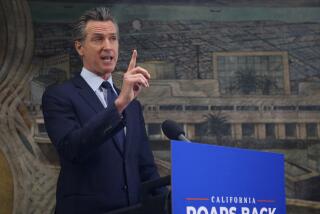Gov. Jerry Brown gets big win but also big responsibility

SACRAMENTO — Gov. Jerry Brown and fellow Democrats have scored a stunning, historic victory in California. But they should have been careful what they wished for.
Brown sold his Proposition 30 tax increase largely on the premise that it would stanch the budget bleeding — that it would end the painful school cuts and, he implied, halt the university tuition hikes.
He’d better hope that’s what happens and that state revenues don’t continue to fall short of spending. Because voters never like to be fooled.
From now on, it will be Brown’s budget repair plan that is in place. No longer will he be able, with a straight face, to blame former Gov. Arnold Schwarzenegger and an intransigent Legislature.
Even more historic, Californians appear to have elected a Democratic two-thirds majority in each legislative house. It would be the first time in 80 years that one party has firmly controlled the entire apparatus of state government. Back then it was the GOP occupying the governor’s office and holding supermajorities in both houses.
In the 1960s and ‘70s Democrats briefly controlled one house or the other with a supermajority. But they didn’t hold absolute power. Now it seems they will. And history teaches us what absolute power can do: affix blinders and corrupt.
If this power is bestowed, the culpability at the Capitol will be entirely on Democrats. They’ll be solely accountable, responsible for rerouting California back onto the right path. No finger-pointing at Republicans.
With a two-thirds vote, there’s virtually nothing that can’t be done in Sacramento. You can raise taxes, override a governor’s veto, write constitutional amendments, propose bond issues. Budgets already can be passed on a simple majority vote because of a ballot measure approved two years ago.
But a legislative veer to the left — for yet higher taxation, more union pandering, denser business regulation — would probably propel voters back toward the right and California’s traditional center.
Fortunately for Democrats and California, the same new system of reforms — a “top-two” open primary and independently drawn, competitive legislative districts — that enabled the majority party to make such dramatic gains also may keep it in check. Newly elected legislators who wander off to the left risk being yanked back home by the voters.
Brown dodged a potentially lethal bullet he himself fired that ricocheted.
When the nation’s framers wrote the Constitution, they designed a republican form of democracy in which public policy was supposed to be decided by elected representatives. But in a 2010 campaign stunt, Brown promised voters “no new taxes unless you, the people, vote for them.”
Brown thus surrendered much of his power. And in asking for the voters’ approval to raise taxes, he broke a rule any trial lawyer learns early: Don’t ask a question unless you already know the answer.
But the wily old pol pulled it off, despite being criticized by many — myself included — for offering mixed, often disingenuous messages.
Brown did it his way, the risky way, the agonizing way — if not the way the framers would have wanted. But it was the winning way and, in the end, surprisingly, not even close.
Prop. 30 passed by roughly 8 percentage points.
“It’s a huge victory — underline huge — for Jerry Brown,” says former Republican legislative leader Jim Brulte, a government affairs consultant.
“In a state that had rejected the last eight tax increases on the ballot, Gov. Brown got the voters to support taxes even in difficult economic times.
“I don’t think you can underestimate the benefits to Jerry Brown of 30 passing. It means he’ll be dealing with much smaller budget problems in the next two years. And it will quiet the liberal Democratic base that has seen nothing but budget cuts during his first two years in office.”
It also means this: Brown will be much stronger, with a taller presence, than the weak governor he would have been had Prop. 30 failed. He’ll be capable of exerting tons more power, a leader who must be dealt with —especially by business, which will have even less reason to work with irrelevant Republicans.
In fact, Brown, 74, just may have sewed up his 2014 reelection Tuesday. The incumbent will be much less likely now to draw a strong challenger if he, as expected, seeks the second term of his second gubernatorial stint.
That’s assuming he doesn’t blow it on some liberal binge or more bullet train-type decisions.
Brown has a new opportunity to attack a previously ignored to-do list that starts with tax reform, spreading the revenue base and making the structure more stable. Prop. 30, unfortunately, heads in the opposite direction by soaking the rich, who aren’t consistently reliable producers of big revenue.
The must list also includes education reform, a slimmed-down water bond and business regulatory relief.
“I realize I’m coming from a generation that sang ‘Kumbaya’ and is naive and Pollyannaish,” says veteran political lawyer Steve Merksamer, who was Republican Gov. George Deukmejian’s chief of staff. “But what the governor needs to do is provide leadership.
“Get everyone together and try to begin the process of less demonizing each other and more working together, even if holding their noses around people they don’t like.”
And, referring to Brown’s hippie-style wooden picnic table that replaced mahogany and leather in the Cabinet room, Merksamer says: “Get rid of the benches. Get back comfortable chairs so they can do some serious discussion with serious people.”
Great idea.
But today the governor deserves congratulations.
He understands more than most politicians, however, that power is cyclical and victory often fleeting.
More to Read
Sign up for Essential California
The most important California stories and recommendations in your inbox every morning.
You may occasionally receive promotional content from the Los Angeles Times.











